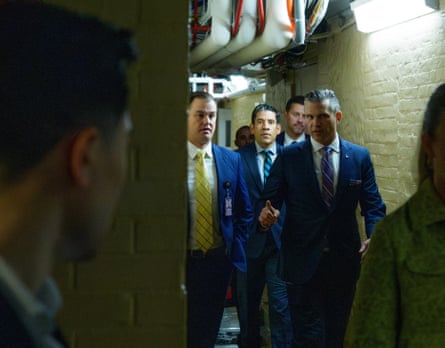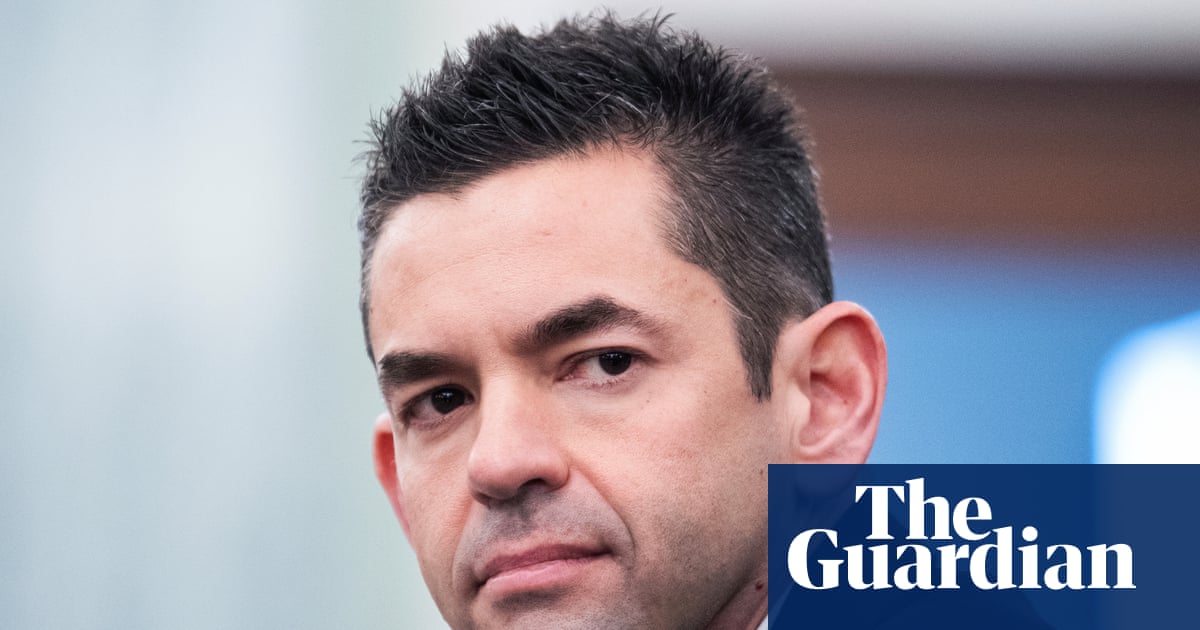The Trump administration is framing its boat strikes against drug cartels in the Caribbean in part as a collective self-defense effort on behalf of US allies in the region, according to three people directly familiar with the administration’s internal legal argument.
The legal analysis rests on a premise – for which there is no immediate public evidence – that the cartels are waging armed violence against the security forces of allies like Mexico, and that the violence is financed by cocaine shipments.
As a result, according to the legal analysis, the strikes are targeting the cocaine, and the deaths of anyone on board should be treated as an enemy casualty or collateral damage if any civilians are killed, rather than murder.
That line of reasoning, which forms the backbone of a classified justice department office of legal counsel (OLC) opinion, provides the clearest explanation to date how the US satisfied the conditions to use lethal force.
But it marks a sharp departure from Donald Trump’s narrative to the public every time he has discussed the 21 strikes that have killed more than 80 people, which he has portrayed as an effort to stop overdose deaths.
A White House official responded that Trump has not been making a legal argument. Still, Trump’s remarks remain the only public reason for why the US is firing missiles – when the legal justification is in fact very different.
And it would also be the first time the US has claimed – dubiously, and contrary to the widely held understanding – that the cartels are using cocaine proceeds to wage wars, rather than to make money.
In a statement, a justice department spokesperson said: “These operations were ordered consistent with the law of armed conflict.” The Pentagon did not respond to a request for comment.
The new rationale being advanced by the administration comes as the legal justification gains heightened importance amid a military campaign against the cartels that shows signs of dramatically expanding.
The US now has an extraordinary force in the Caribbean with the arrival of the USS Gerald Ford, the world’s most advanced super-carrier, which brings capabilities to hit land targets, which Trump has said he wants to pursue.
And this week, defense secretary Pete Hegseth threatened senator Mark Kelly with court-martial after he recorded a video with five other Democratic lawmakers warning military members to question unlawful orders, apparently in reference to the strikes.

Cartel goals disputed
According to three lawyers directly familiar with the OLC opinion blessing the boat strikes, the collective self-defense argument is said to be a key plank of the legal analysis.
The opinion formalizes a 21 July meeting of a “restricted interagency lawyers group” of four career and four political appointees from the Pentagon, the office of the joint chiefs of staff, the CIA, the White House and the OLC.
It principally argues that the US has entered an armed conflict with the cartels because it is helping allies in the region like Mexico and Colombia, which, according to an administration official, asked for US help confidentially for fear of reprisals.
The armed conflict designation is key because it allows Trump to operate under the so-called law of armed conflict, which permits the use of lethal force without violating federal murder statutes or international law.
The opinion then finds Trump does not need congressional approval because the administration satisfied OLC’s two-prong test: whether the strikes serve a national interest, and whether they would not be of a prolonged scope, nature or duration.
For instance, it outlines four areas of national interests the strikes serve, from the duty to provide assistance to allies, to preserving regional stability, to protecting the US from the influx of illegal drugs themselves.
But despite the plausible legal framework, the OLC opinion relies on a fact pattern about the cartels for which no public evidence appears to exist.
The closest analogy is perhaps the Taliban and al-Qaida trafficking opium during the war on terror to finance its terrorist activities. But in that instance, it was clear their primary goal was to wage armed attacks against the US and Nato allies, and the opium financed their weapons.
It is uncertain whether the same applies to drug cartels in Latin America.
Martin Lederman, a former deputy assistant attorney general at OLC during the Obama and Biden administrations, expressed skepticism with the administration’s claims about collective self-defense.
“A significant problem with this theory is that they still have not identified any state that’s engaged in an armed conflict with a particular cartel,” said Lederman.
“Nor has the administration provided any evidence that another state engaged in such an armed conflict has asked the US to destroy cocaine shipments that are allegedly being used to subsidize armed violence against the requesting state,” he said.
An administration official said it had evidence that each boat carries around $50m worth of cocaine, the proceeds of which are being used to acquire sophisticated weapons, but the underlying intelligence is classified.
Still, the justice department’s OLC is not an expert in assessing the intelligence findings or the purported objectives of the cartels; typically, it ends up deferring to the US intelligence community.
For this opinion, a senior administration official acknowledged, OLC did not attempt to stress-test the purported goals of the cartels – or the underlying facts to determine the existence of an armed conflict.
OLC considered only a narrow question posed by the White House of whether it was a lawful policy option for the president to use military force against unflagged vessels in international waters transporting cocaine.

 German (DE)
German (DE)  English (US)
English (US)  Spanish (ES)
Spanish (ES)  French (FR)
French (FR)  Hindi (IN)
Hindi (IN)  Italian (IT)
Italian (IT)  Russian (RU)
Russian (RU)  3 weeks ago
3 weeks ago
























Comments